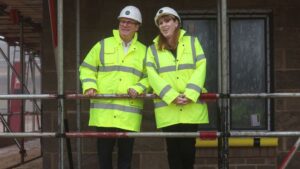The 2011 London riots prepared Starmer for stopping unrest but tackling deeper roots of protests will be much harder
The prime minister has experience of using the justice system to swiftly deal with disorder on the streets of the UK. But Adam Boulton writes that his government must deal with two more complex and longer-term problems to tackle the deeper issues behind the unrest.

Every violent protest has its own reasons but sunny weather doesn’t help.
In any season police will tell you that “PC Rain” is the most effective officer keeping trouble off the streets. On warm days and nights in summer more people are out and about rubbing up against each other. Tempers of the hot and bothered fray more easily.
Tensions are high this sultry weekend after rallying calls were identified online calling for protests – with mosques or hotels housing asylum seekers the preferred rallying points for many protesters.
Rioters clashed with police on Saturday in several towns and cities across the UK.
Protests latest:
The weekend’s unrest so far
When asked if he feared a “summer of riots” this week the prime minister dodged the question by concentrating on recent specific events.
After the protests which have flared in Southport, London, Leeds and elsewhere following the killing of three little girls, Sir Keir warned he has to deal with “a group of individuals who are absolutely hell-bent on violence”. That was why he had decided “to pull together senior police officers” to ensure that “this is met with the most robust response, not just in the coming days but all the time”.
An effective response to rioting requires appropriate powers for the police and swift justice for offenders.
In the longer term, though, there are two more complex tasks – to try to counter external forces, such as the internet, which may have facilitated trouble-making and, most difficult of all, to decide how to respond to the grievances of those causing the mayhem.
Starmer is an expert after London riots experience
Sir Keir is an expert on the judicial side of dealing with disturbances. He was Director of Public Prosecutions when the so-called “London riots” broke out in August 2011.
After Mark Duggan, a black man, was shot dead by police, rioting spread over the next few days across much of London and into other inner cities including Bristol, Birmingham, Coventry, Leicester, Liverpool, Derby and Nottingham. Around 3,000 people were arrested with more than 2,000 going on to face criminal charges and prison sentences.
The disturbances this year are not on the scale of 2011.
If there is more trouble Starmer will make sure the authorities do what he did then.
He kept the courts open 24/7 to process offenders and allowed magistrates to pass longer and tougher sentences.
“For me it was the speed [of processing cases] that I think may have played some small part in bringing the situation back under control,” he said afterwards. He added: “I don’t think people gamble on the length of sentence, particularly. They gamble on: ‘Am I going to get caught? Am I going to get sentenced and sent to prison?’ And if the answer is: ‘I’m now watching on the television some other people who had been caught 24 hours or 48 hours after they were on the streets with us’ – I think that’s a very powerful message.”
How this would sit with courts and prisons which are considerably more overcrowded than they were then remains to be seen.
Internet crackdown may not be the answer
The prime minister is setting up a new police unit to tackle disorder but senior officers are adamant that their forces have adequate legal powers to deal with the situation.
Suella Braverman, the then home secretary, attacked police forces for not being tougher on the recent pro-Palestinian marches. Senior officers retort they have to make a judgement as to whether heavy-handed intervention while a situation is developing could make things worse.
Instead, modern technologies such as face profiling and filming can allow them to identify and prosecute offenders afterwards, in quieter circumstances.
Police are similarly ambivalent about demands for a clampdown on the internet. Nobody doubts that social networks made it possible for mobs to gather so quickly in Southport and elsewhere.

Keep up with all the latest news from the UK and around the world by following Sky News
Rather than being rallies organised by a political organisation such as the English Defence League, experts say they often develop spontaneously through “post-organisational” networks, prompted by comments about current events by individuals.
These messages often entertain untrue conspiracy theories but they are, carefully, not invitations to riot. They may be posted by unknown individuals or even by celebrities.
The view of police gathering information to counter violent protests is that the internet is their most vital source of intelligence. Those involved in setting up protests are going to use the internet one way or another and the police need to keep track of them.
A total ban on the internet does not seem feasible in advanced democracies. Bans on “hate speech” are proving ineffective, even without the staunch libertarian views of the tech billionaires who control the platforms.
Be the first to get Breaking News
Install the Sky News app for free


PM must tackle root causes – and hope weather turns
Sir Keir insists that only “a tiny mindless minority” and “gang of thugs” willing to travel are behind the violence following the Southport stabbings. This may be true but it avoids confronting deeper issues in our society.
The slogan “enough is enough” about immigration is shared by peaceful protesters and “thugs” alike and it resonates more widely than those present at the violence – including swing voters in places like Southport who voted Labour for the first time this year.
At last Monday’s cabinet meeting Yvette Cooper, the home secretary, and Pat McFadden, one of the most senior members of the government, both warned that they must come up with answers to these concerns urgently – especially reducing the number of small boat crossings. Doing this while keeping Labour’s more traditional supporters onside will be much more difficult than delivering swift justice for violent protesters.
The stabbings are not the only reason behind major disturbances this summer.
In Leeds last month violent disturbances flared after social workers intervened on a family. Previously other potential incidents have broken out – from peaceful demonstrations about issues with wide support in the community such as Black Lives Matter, or for an immediate ceasefire in Gaza.
The first job of political leaders is to respond constructively to these motivations, but not necessarily to agree with them.
Police chiefs insist that the justification for mob violence should make no difference to the way their forces deal with it.
Until the weather breaks, Sir Keir Starmer’s best hope is that people in troubled areas of the country stay cool, calm and collected, and off the streets.


